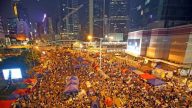【新唐人2014年10月22日訊】香港行政長官梁振英19號指責有外國勢力介入香港政治,參與佔中,受到佔中團體和泛民議員的反駁。20號,他又對外國媒體表示,反對普選的原因,是因為存在讓低收入居民成為政治主導聲音的風險。這些言論使他連日來陷入爭議。
行政長官梁振英19號在接受亞洲電視英文臺的錄影訪問時表示,外國勢力一直有介入香港政治,佔中行動也有不同國家的外部勢力參與,不過他拒絕說明是甚麼國家,或舉出例子。中共外交部發言人華春瑩在第二天,再次重復了梁振英的這一說法。
話音一落,「和平佔中」發起人之一陳健民,學民思潮召集人黃之鋒,壹傳媒集團主席黎智英等人,都要求梁振英拿出證據來。陳健民還表示,這顯示香港越來越大陸化,當政府無法對付民間力量時,就進行抹黑。
另外,泛民主派26位立法會議員致信給行政長官辦公室,譴責梁振英的有關言論,並要求他拿出證據。
真普聯召集人鄭宇碩:「我們的立場是很簡單的。第一、你說有外國勢力干預,那就拿出證據來。要是民主運動有任何人犯了法,那你就依法起訴他。沒有證據,就不要亂說話,作為一個香港政府的首長,這樣說話是非常不負責任。」
真普選聯盟召集人鄭宇碩教授認為,如果有切實的證據,完全可以依靠國際法處理。
鄭宇碩:「外國政府有任何不法的行為,不適當的行為,那中國政府就按外交途徑提出抗議,把有關的外交人員驅逐出境。這也是國際慣例麽,這也是國際法麼,那就按國際法辦事。」
儘管所謂「外國勢力介入」的說法已經備受爭議,梁振英20號晚上在禮賓府接受《紐約時報》、《華爾街日報》和《金融時報》訪問時,又做出了另一個令人費解的言論。
梁振英說,公開選舉產生下一屆香港特首的方法,是不可接受的。部分原因是,這樣可能會產生風險,讓比較貧窮的居民主導政治。
他說,提名委員會中的「廣泛代表性」不是指人數,如果只計人數,那就要和佔香港一半人口的,月收入低於1800美元的港人對話,這樣會使政策傾斜。
中國問題獨立評論員李善鑒:「他說不能夠接受民選,是因為如果民選了的話,下層的民眾,他們就會主導選舉的結果。這個邏輯其實更奇怪,而且這個邏輯應該說,跟共產黨當年鼓動群眾造反奪權的整個理論,表面上看是完全相反的。」
鄭宇碩:「這樣的說法明顯的是違背了民主的原理。要是依據梁振英這樣的解釋法呢,那任何國家都不用推動民主了,不用推動一人一票了。那中共歷代領導人都是說『人民才是國家的主人翁』,那梁振英這樣子說,是不是說這些中共領導人所說的,都是騙人的話啦?」
那麼,梁振英為甚麼要用上和中共歷來言論自相矛盾的理由,來否定普選的可行性呢?
李善鑒:「我覺得他是,完全應該說是在轉移話題了。他就是不敢點出來核心,造成這次佔中的原因是甚麼?不就是因為你共產黨當時答應港人治港,你答應讓港人普選,你現在不敢讓,完全自己說的話不算數了。」
鄭宇碩教授指出,目前香港社會存在很大不滿,根源在於官商勾結,經濟繁榮的成果不能讓普通市民分享。一方面貧富越來越懸殊,一方面政府的政策卻傾向大財團。因此,鄭宇碩認為,梁振英這樣的態度,事實上就是香港社會矛盾最基本的根源,也是目前佔中運動、要求民主運動的最基本動力。
採訪/朱智善 編輯/尚燕 後製/郭敬
H.K Chief Executive Mired in Controversy
Foreign Intervention and Poor People in Power
On Oct 19, Hong Kong Chief Executive Leung Chun-ying
accused foreign forces of intervening in Hong Kong’s politics
and participating in Occupy Central.
This was refuted by the groups of Occupy Central
and Members of Pan-Democratic Parties of Hong Kong.
On Oct 20, C Y Leung told the foreign media
that the reason for opposing the current plan
of universal suffrage raised by the Mainland,
is the risk of low-income residents becoming
the dominant political voice.
These remarks cause him more controversy in recent days.
On Oct 19 Chief Executive Leung Chun-ying said
in a video interview with English station ATV,
foreign forces have always intervened in Hong Kong’s politics.
Occupy Central movement is also
involved with external forces of different countries,
but he declined to specify what country or cite examples.
Chinese Foreign Ministry spokeswoman Hua Chunying
repeated this statement the next day.
Just after Leung Chun-ying’sassertion was published,
an initiator of “Occupy Central in peace" Chan Kin-man,
Scholarism founder Joshua Wong,
and Chairman of Next Media Group Jimmy Lai
all required Leung to provide evidence for his remarks.
Chan Kin-man also said that
this shows Hong Kong has become more and more
like Mainland China: when the government was
unable to deal with the civil forces,
then they discredited them.
In addition, 26 Legislative Council members
of the pan-democratic parties sent a letter
to the Chief Executive’s Office,
condemning Leung Chun-ying’s remarks,
and asked him to come up with evidence.
True Universal Suffrage Alliance convener
Joseph Yu-shek Cheng: “Our position is very simple.
First, you said foreign forces intervene,
then please evidence it.
If anyone involved in the democracy movement
violates the law, then you can prosecute him
according to the law.
If you have no evidence, please don’t talk nonsense.
As a head of the Hong Kong government,
to make such remarks is very irresponsible."
Professor Joseph Yu-shek Cheng believes that
if there is tangible evidence, the government can completely
rely on international law to deal with it.
Joseph Cheng: “If foreign governments commit illegal acts,
or inappropriate behavior, then the Chinese government
must protest through diplomatic channels,
and expel relevant diplomats according
to international practice and international law."
Although the “foreign intervention" remark
has been controversial, Leung Chun-ying on the 20th night
in the Guest House made another puzzling remark
to “New York Times", “Wall Street Journal"
and the “Financial Times".
He said that it was unacceptableto allow his successors
to be chosen in open elections, in part because doing so
would risk giving poorer residents a dominant voice in politics.
He said that “broadly representative"
for the Nominating Committee is not numeric representation.
If it is entirely a numbers game and numeric representation,
then obviously you would be talking to half of the people
in Hong Kong who earn less than $1,800 a month.
This would make policies preferential to them.
Mr Li Shankan is an independent commentator
on China’s issues. He says: “He said he did not
accept open election because if elected in that case,
the lower class people will dominate the election results.
This logic is in fact more strange.
Seemingly, this logic should be completely opposite
to the CCP’s theories of agitating
the public to rebel in the early period."
Joseph Yu-shek Cheng: “This statement is clearly contrary
to the principles of democracy.
According to Leung Chun-ying’s interpretation
of democracy, then no country needs
to promote democracy and one-person one-vote.
All the leaders across generations of the CCP said
“the people. are the masters of the country",
so is such a remark from Leung Chun-ying to deny
this statement of the CCP heads?
Or to accuse them of telling a lie?"
So why does Leung Chun-ying use an excuse
which contradicts the principle of CCP leaders,
to deny the feasibility of universal suffrage?
Li Shankan: “I think he completely diverted
the discussion topic. He did not dare
to point out the core of the event.
What are the reasons for this Occupy Central?
It is the promise that the CCP gave in that time
about Hong Kong people ruling Hong Kong.
The CCP made a promise to let Hong Kong people
carry out universal suffrage, but now
they don’t dare to keep the promise.
This is completely breaking the promise."
Professor Joseph Yu-shek Cheng pointed out that at present
considerable dissatisfaction exists in Hong Kong society,
which is rooted in the collaboration
between officials and merchants.
They cannot allow the general public to share
the fruits of economic properity.
On one hand the disparity between rich and poor
is growing, and on another, the government’s policies
gave preference to the big companies.
Therefore, Professor Cheng believes that this attitude
from Leung Chun-ying, in fact, is the basic root cause
of social conflicts in Hong Kong.
This is also the most basic motivation
of the current movement
of Occupy Central demanding democracy.
Interview/Zhu Zhishan Edit/ShangYan Post-Production/GuoJing



















